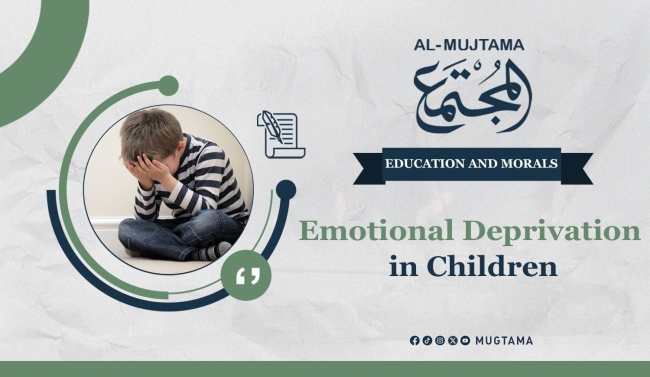Emotional neglect, or emotional deprivation, is a common issue that directly affects children, impacting their psychological and social development. Emotional neglect is defined as the failure to meet a child's emotional needs, whether intentional or unintentional 1. However, this neglect can lead to long-term effects on mental health and social interaction, influencing the development of their personalities and relationships in the future.
Effects of Emotional Deprivation on Children
American psychologist Megan Gunnar found that emotionally deprived children may struggle with executive functions 2, such as:
1. Working Memory: The ability to gather information to process and retrieve stored information for use in desired situations.
2. Inhibitory Control: The ability to stop thinking and reflect. It helps control the need to stop thinking before acting or speaking.
3. Cognitive Flexibility (Flexible Thinking): The ability to think flexibly and solve different problems. 3
Psychological studies indicate that children suffering from emotional neglect exhibit a variety of symptoms and problems, such as severe anxiety, difficulty regulating emotions, and an inability to understand the mental states of others. Additionally, the following issues may arise:
1. Low self-esteem: The child may grow up with a constant feeling of inadequacy and lack of self-worth, which affects their self-perception and their ability to interact with others.
2. Difficulties in social relationships: Children who lack the necessary emotional support find it difficult to build healthy relationships with others, both in childhood and adulthood.
3. Impact on mental health: Emotional neglect can lead to depression, anxiety, and other mood disorders at an early age, hindering their normal development. 4
Dr. René Spitz, an American psychoanalyst, highlighted the negative effects of emotional deprivation through a study of children in Romanian orphanages. What he discovered was devastating: emotionally deprived children suffered from reduced brain size, high levels of cortisol (a stress hormone that helps the body respond to danger) in their brains, and changes in the prefrontal cortex. 5
Causes of Emotional Deprivation
Emotional deprivation occurs for several reasons, including:
- Parental Occupation: With the pressures of modern life and economic strains, parents may be preoccupied with work and find little time for emotional attention to their children.
- Unhealthy Family Models: Some families rely on strict and harsh educational traditions where emotional expression is not allowed, promoting emotional deprivation.
- Parents’ Psychological Problems: Some parents may themselves suffer from psychological issues or personality disorders that hinder their ability to provide emotional support to their children.
Since the early years shape and influence children's future, physical, mental, and emotional health, UNICEF launched a campaign called "Early Moments Matter." Its goal is to raise awareness of the importance of healthy brain development in the first years of life and to encourage investment by governments and companies in early childhood development programs, policies, and services, supporting parents and caregivers to give children the best start in life. 6
Islamic Guidance on Meeting Children’s Emotional Needs
In Islam, there are teachings that encourage a comprehensive upbringing for children, which includes emotional, physical, and spiritual aspects. Many hadiths emphasize kindness and love for children. The Prophet Muhammad ﷺ said: "He is not one of us who does not have mercy upon our young, nor knows the honor of our elders" (Tirmidhi). This prophetic guidance highlights the importance of mercy and tenderness when dealing with children.
It is also reported that the Prophet ﷺ would show love to children, kiss them, and play with them, indicating that emotional care is not optional but a parental duty. This was well understood by the honorable companion Anas ibn Malik, who lived with the Prophet as a child and served him for ten years, never experiencing any harshness or ill-treatment from the Prophet, only mercy and kindness.
Among the most notable hadiths in this context is the narration by Al-Aqra' ibn Habis, who saw the Prophet ﷺ kissing Hasan and Husayn, and said: "I have ten children, but I have never kissed any one of them, whereupon Allah's Messenger (ﷺ) said: He who does not show mercy (towards his children), no mercy would be shown to him." (Sahih Al-Bukhari).
Moreover, the Prophet ﷺ was keen on teaching children beneficial lessons. For example, Ibn Abbas -may Allah be pleased with him- narrated: "One day, I was behind the Prophet ﷺ when he said to me: 'O boy! I will instruct you in some matters. Be watchful of Allah (Commandments of Allah), He will preserve you. Safeguard His Rights, He will be ever with you. If you beg, beg of Him Alone...' " (Tirmidhi). 7
-------------------------------------------------------------
1. Labayh for Mental and Family Health
2. Psychology Today: Emotional Deprivation or Neglect? How to Tell the Difference
3. Bangkok Hospital: Executive Functions Develop Children's Concentration
4. Positive Psychology: Childhood Emotional Neglect - 5 Consequences of Childhood Emotional Neglect
5. Psychology Today: Emotional Deprivation or Neglect? How to Tell the Difference
6. UNICEF: Early Moments Matter
7. Alseerah Alnabaweyah Website: The Prophet's Love for Children


